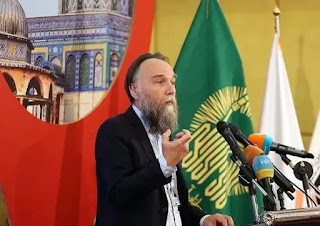Meet The Most Dangerous Man In The World
With his unkempt beard, an obsession with the mystical and the occult, and a powerful hold over Russia’s leader, it isn’t hard to see why Aleksandr Dugin is likened to a modern-day Rasputin.
The ultra-nationalist, ultra-conservative philosopher has a considerable profile in Russia, where he is known as ‘Putin’s brain’, his writings and utterances providing an ideological veneer for the president’s cynical power plays.
Beyond his country’s borders, he has been a less familiar figure – but that is now beginning to change, both as Vladimir Putin’s actions become increasingly reckless, and as Dugin himself becomes a guru for far-right activists in the West.
Of course, his distinctive appearance, and unmistakable likeness to the ‘Mad Monk’ who bewitched the family of Russia’s last Tsar, have helped considerably in this. Dugin is, though, far from being ‘Russia’s greatest love machine’. Born in 1962, he is in a long-standing, apparently stable marriage to fellow philosophy graduate Natalia Melentyeva and has two children.
Rather than copying his dissolute lifestyle, Dugin’s most dangerous replication of Rasputin is in manoeuvring himself into a position of great influence over an authoritarian ruler, while avoiding any direct accountability.
Some observers, such as the Russian journalist, Alexander Nevzorov, and professor Marlene Laruelle of George Washington University, believe that Dugin’s sway over Putin is overstated. They note the absence of any apparent personal friendship between the two men. Nor is Dugin a known party to the dubious, shared financial interests that are a hallmark of Putin’s inner circle.
But Dugin is heavily promoted by the Kremlin-controlled Russian media and has strong ties to the military. He lectured for many years at the Russian Military Staff Academy, where his writings apparently remain a core part of the curriculum.
Most of all, the connection between Dugin’s thoughts and Putin’s actions is too great to be mere coincidence.
Dugin and Putin’s views are rabidly anti-Western, anti-liberal, totalitarian and socially backward, with an oddly obsessive focus on homosexuality. Both are fervent proponents of expanding Russia’s power in pursuit of these ideas. They exult in the use of underhand methods or military force to do so.
Their common worldview appears to stem from a shared background as children of the Soviet system. When the USSR collapsed, both felt the sudden loss of empire and personal status acutely.
Putin was famously a mid-ranking KGB officer who was forced to return home from East Germany broke, jobless and with his pride badly dented. Dugin’s father was a colonel-general in Soviet military intelligence. While Dugin was already exploring fascism and questioning communism before the Eastern Bloc disintegrated, he nonetheless mourned the loss of Russian power.
The Russian president’s repeated recent aggression is partly the product of his ultra-cynical pragmatism. These actions create a crucial diversion from the domestic repression, corruption and economic failings of his rule. This helps Putin to hold on to the power upon which his personal security and assets depend.
But Dugin’s rise to prominence has proceeded in lockstep with Putin’s growing nationalism and there is little doubt that Putin’s behaviour is strongly influenced by Dugin’s ideas.
Rather than being original, Dugin’s ‘Eurasianist’ ideology is mostly a hotch-potch of earlier anti-Bolshevik, Italian fascist and German Nazi thoughts, adapted to Russia’s current circumstances.
As Charles Clover wrote in Black Wind, White Snow: The Rise of Russia’s New Nationalism, the original Eurasianism stemmed from the ideas of turn of the 20th century academics like Sir Halfold Mackinder, who saw geography as the most important factor in world politics. This pitted Russia, with its enormous Steppe lands and harsh winters, against the preeminent sea powers such as Britain and, later, the United States.
Exiled Russian anti-Bolshevik writers such as Nikolai Trubetzkoy expanded on this notion in the 1920s in books like Exodus to the East. They argued that Russia’s exposed geography and vastness mean its rulers have no choice but to focus on securing its territory. This situation compels them to think imperially, consuming and assimilating dangerous populations on every border.
Dugin has reinterpreted these ideas in publications such as The War of the Continents and The Foundations of Geopolitics to prophesise an inevitable conflict between the land power (Russia-led Eurasia) and the sea power (the US-led West). This conflict will continue until one side is destroyed completely. (Spoiler alert: he is convinced the liberal West will be the loser).
Dugin has grafted traditional ultra-conservative Russian beliefs on to these disturbing geopolitical ideas. Russia, he claims, is a unique civilisation based on hard-line Orthodox religiosity and a powerful, authoritarian state. The country has a messianic mission to lead the fight against the alien Western doctrine of rationalism.
Contrary to the original Eurasianists who were largely anti-Nazi, Dugin has incorporated fascist ideas into his prospectus. He is a devotee of the 1930s pro-Nazi writings of German philosopher, Martin Heidegger, amongst other more unequivocally extremist thinkers of the inter-war era. Dugin’s resulting ideology replicates the Nazis by prizing blood and soil ethnic mysticism and personal submission to authority over the rule of law and individual freedom.
While Dugin has modified his anti-Semitism in recognition of Putin’s increasingly close relationship with Israel’s right-wing Prime Minister, Benjamin Netanyahu, his admiration for aspects of Nazism remains open. He has praised the Waffen-SS as “an intellectual oasis in the framework of the National Socialist regime”.
Dugin has also parted company with his Eurasianist predecessors by vastly expanding, with little attempt at justification, the area he believes should be subjected to Russian dominance. Rather than restricting it to, roughly, the territory of the former Soviet Union, he arbitrarily incorporates most of Europe, China and Mongolia, and recommends turning south towards the Indian Ocean.
The influence of Dugin’s ideas on Putin’s domestic policies can be clearly seen in the Russian president’s growing authoritarianism and increasing focus on co-opting the Russian Orthodox church over recent years. This includes moral crusades against supposed Western infections such as homosexuality and the degeneracy of artists and campaigners like the feminist Pussy Riot collective.
Externally, Dugin’s impact can be seen in Putin’s creation of the Eurasian Economic Union, which several former Soviet nations have been coerced into joining, and the more nakedly aggressive invasion of Ukraine.
In the latter case, Dugin is so confident of his position in Putin’s orbit that he has ventured some mild criticism, exhorting his president to go further and seize more of Ukraine. According to Dugin, but not the vast majority of Ukrainians, Ukraine “welcomes Russia, waits for it, pleads for Russia to come”.
Dugin’s influence on Putin is further evidenced by the Kremlin’s extensive support for fascist and other right-wing extremist parties across the West. The Russian regime regularly deploys Dugin to represent it in meetings with far-right visitors from Europe, such as Italian interior minister Matteo Salvini and Gábor Vona of Hungary’s Jobbik neo-fascists.
Dugin’s long-standing cultivation of western extremists has been widely reciprocated. He has become a cult figure for many of them, including former KKK leader David Duke. A younger American white-supremacist acolyte, Richard Spencer, even married Dugin’s English translator and promoter in the US, Nina Kouprianova.
Perhaps Dugin’s most dangerous Western admirer of all is Steve Bannon, who has regularly expressed his support for Dugin’s Eurasianist ideology. The president that Bannon helped place in the White House, Donald Trump, is actively engaged in fulfilling Dugin and Putin’s agenda by weakening Western alliances such as NATO and aligning the US with pro-Kremlin, right-wing fanatics around the world.
Professing patriotism while favouring the interests of a self-proclaimed enemy state over those of your own country is an integral part of the incoherence of far-right nationalism.
Alexander Dugin is peddling a rehashed version of the fascist ideology that once led the world into catastrophe. But the substantial influence Dugin exerts over ultra-powerful people like Putin and, indirectly, Trump, makes him a frightening figure.
Rasputin
A society figure, Rasputin met the Russian ruler Nicholas II in 1905.
The following year he began acting as a healer for the Tsar’s son, who suffered from hemophilia. He was a divisive figure at court and became increasingly unpopular, during the First World War, as his influence grew and the nation’s theneweuropean.co.ukfell.
In December 1916, he was assassinated by a group of noblemen, opposed to his closeness with the royal family.
source - theneweuropean.co.uk




Comments
Post a Comment